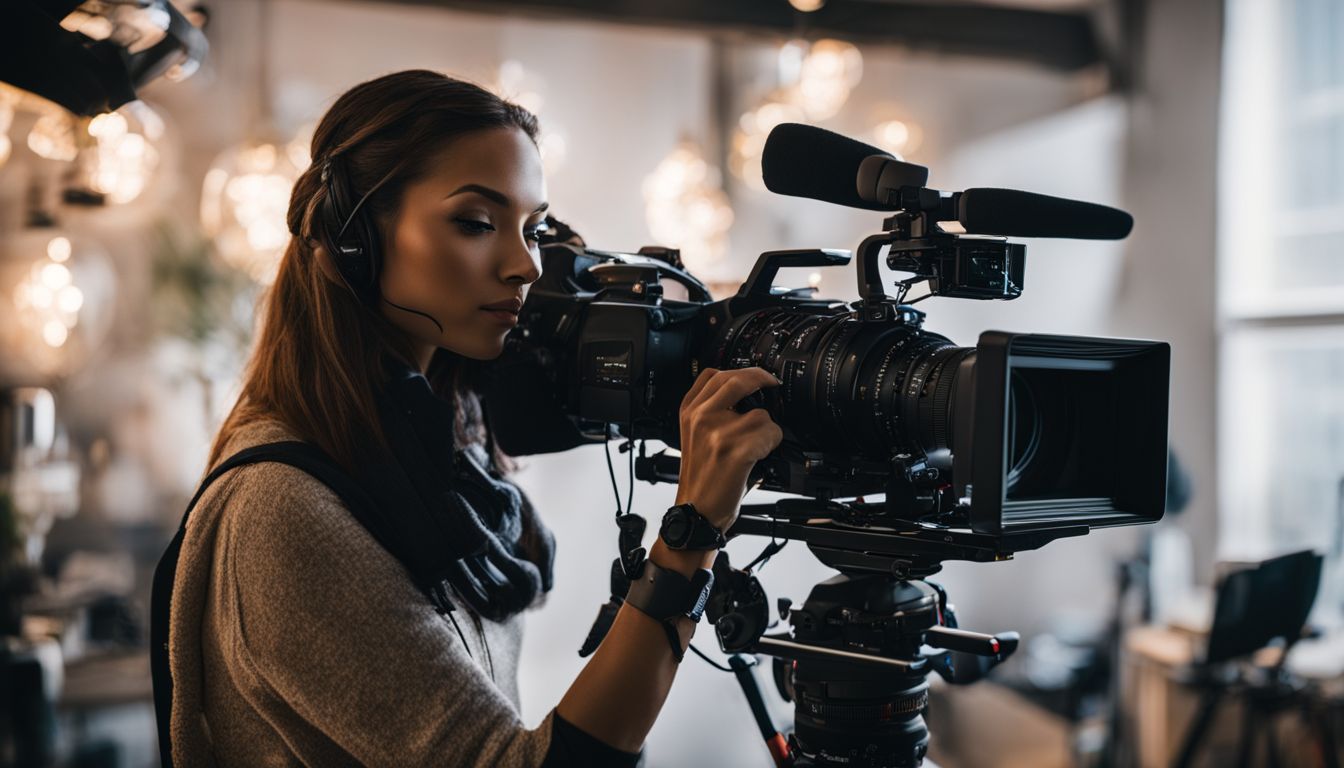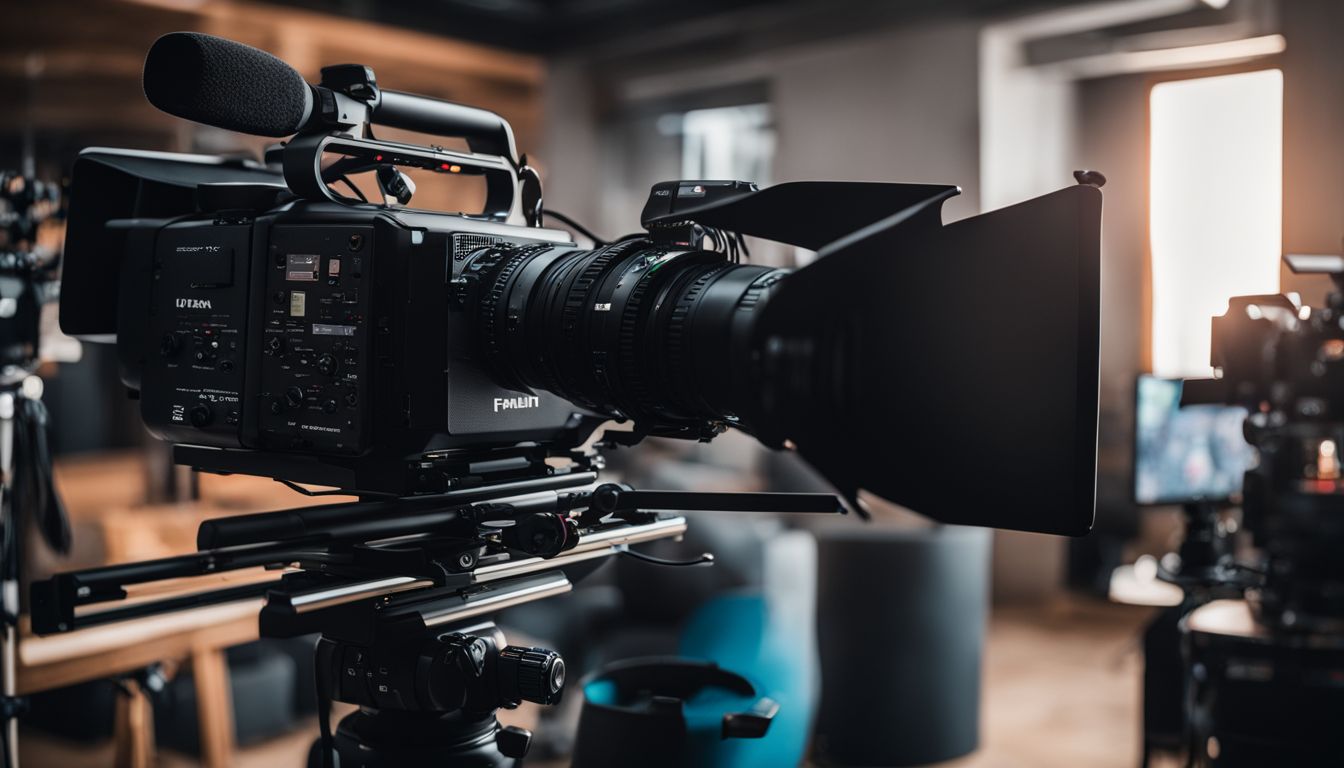Are you intrigued by the prospect of delving into videography, but feel a touch daunted by what might lie ahead? Trust us, we completely understand. We’ve all experienced that initial hesitation too.
With this article, our aim is to unravel the intricacies and arm you with clear-cut knowledge to kick-start your adventure in this captivating field. From insights on the role of a videographer to guidance on becoming one; from tackling challenges to comprehending salaries & opportunities – together we’ll immerse ourselves fully into this alluring world!
Key Takeaways
- Videography can be challenging, but with dedication and practice, it is possible to learn the necessary skills.
- A videographer’s role involves capturing footage, editing videos, and telling stories through visuals.
- To become a videographer, you can pursue formal education in film production or gain experience through personal projects and internships.
- Starting your own videography business requires mastering technical skills and building a portfolio to attract clients.
- Being a videographer may come with challenges like planning shots, handling equipment, and staying updated with industry trends.
- Videographers need creativity, interpersonal skills, technical expertise, time management abilities for success in their careers.
- The average salary of a videographer ranges from £20k to £30k per year. Freelancers have the flexibility to set their rates based on experience and project complexity.
What Does a Videographer Do??

A videographer is responsible for capturing and recording footage for various purposes, such as documentaries, commercials, events, or films. They need to have a range of technical skills and be able to tell a story through their visuals.
Roles and responsibilities
Videographers have many tasks to do. They need to set up and run cameras. They must know how to handle lights and other gear. Videographers also have to edit the video clips they shoot. Sometimes, they work with sound too.
Skills required
We need certain skills to do videography well.
- A good eye for detail: We have to pay keen attention because small mistakes can change the quality of the video.
- Camera techniques: Knowing how to work with a camera is key. This includes understanding light, composition, and how to use different lenses.
- Storytelling skills: Telling a story through video is very important.
- Time management: Managing time well makes sure we can get a lot done.
- Handling equipment: High-quality cameras and gear give us better videos.
- Teamwork: Working in a group lets us focus on different parts of the job.
- Continuous learning: We always need to be learning new trends and ways to make our work better.
How to Become a Videographer
 To become a videographer, you can start by pursuing formal education or qualifications in film production, video editing, or cinematography.
To become a videographer, you can start by pursuing formal education or qualifications in film production, video editing, or cinematography.
Formal education and qualifications
To get into videography, you often need a high school diploma or its same. Some of us also choose to take courses in film making, film editing or camera use. This helps gain deeper knowledge about the craft.
It is good if we have a college degree in arts related to filming or video production as well. These degrees can give us more skills and knowledge that we might need. But remember, strong desire and self-drive are just as important as your formal education! The more you practice and learn by doing, the better your skills will become.
Gaining experience and building a portfolio
We all need to start somewhere to get into videography. Let’s see some of the ways you can gain experience and build a portfolio.
- Start shooting your own videos. Work on personal projects or help out a friend. This gives you practice and content for your portfolio.
- Join a film club or group. It lets you learn from others and find chances to work on projects.
- Take part in local film contests. They offer chances to show your skills and win prizes.
- Look for intern jobs in video production firms or TV stations.
- Attend workshops and courses on videography skills to boost your learning.
- Keep up with new trends in video production and techniques.
- Try different forms of video like short films, documentaries, or music videos.
- Make sure you know how to use lighting to make your shots look good.
- Get better at using camera operation tools such as stabilisers for smooth shots.
- Don’t forget about editing! Learn how video editing can change the final product.
- Show off your best work in an online portfolio that grabs attention.
Starting your own business
Setting up your own business in videography is a big step forward. We have to learn many things before we begin. First, we must know all about video production and editing. It takes time to master these skills but hard work pays off.
Is Being a Videographer Stressful? – Challenges and Coping Mechanisms
Yes, being a videographer can be tough. There are many tasks to handle alone. It also takes time and hard work to learn all the skills needed. We face challenges like getting the right light or setting up the best shot with our cameras.
Even small mistakes can make our videos look bad.
We also have to plan before we start filming. This helps to make sure everything goes well and that our video looks great at the end. Shooting videos gets easier when we work as part of a team where everyone does their own task.
As videographers, it’s important for us not just to learn but also stay updated about new ways of doing things in our field of work. This helps us do better each time we take on a project.
Also, not having good equipment can make it harder for us to shoot great videos. So, investing money in buying high-quality cameras and other tools is very important.
When things get too tough, taking short breaks from work helps lots of videographers feel less stressed out while working on their projects which makes them enjoy what they do even more!
Challenges and Skills Needed in Videography
Creativity, interpersonal skills, technical skills, and time management are essential for videography. Discover the difficulties videographers face and how they cope with them.
Creativity and storytelling
In the world of videography, storytelling and creativity go hand in hand. We use our creative minds to tell stories through videos. This is not an easy task. It needs a lot of practice and learning.
We need to understand how shots work together to make a good story. Lighting plays a big role too. With the right light, we can set the mood for each scene. We also have to keep up with new video trends to stay fresh and exciting in this field.
Interpersonal skills
Having good interpersonal skills is crucial for videographers as it helps in building strong relationships with clients, team members, and other professionals in the industry. Effective communication skills are necessary to understand and meet the needs of clients, ensuring that their vision is translated into the final video product.
Collaborating with a team also requires good interpersonal skills, as it involves working together towards a common goal and resolving conflicts that may arise during the production process.
Additionally, being able to network and maintain professional relationships can open up opportunities for new projects and referrals in the competitive field of videography.
Technical skills
As videographers, we need to have a good grasp of technical skills to excel in our craft. This includes understanding how cameras operate and the different techniques that can be used to capture compelling footage.
We also need to learn about composition, lighting, and editing so that we can create visually appealing videos. It’s important for us to stay updated with the latest technology advancements in the industry as well.
By continuously learning and honing our technical skills, we can produce high-quality videos that leave a lasting impression on viewers.
Time management and multitasking
Managing your time effectively and multitasking are crucial skills for videographers. As a videographer, you have to account for various aspects of video production, such as planning, shooting, editing, and post-production.
This requires careful scheduling and organization to ensure that all tasks are completed on time. You need to prioritize your work and allocate sufficient time for each stage of the process.
Multitasking is also essential because you may find yourself juggling multiple projects simultaneously or handling different responsibilities within a single project. It can be challenging to balance these demands, but with practice and efficient time management strategies, you can navigate through the workload more smoothly.
Salary and Career Opportunities in Videography
Videography offers various salary and career opportunities, with the average salary ranging from £20,000 to £30,000 per year. Freelance videographers have the flexibility to set their rates, which can range from £200 to £500 per day depending on experience and complexity of the project.
Job prospects in videography are growing steadily due to the increasing demand for video content in various industries such as marketing, entertainment, and social media. With the right skills and a strong portfolio, videographers can find success in both freelance work and full-time positions within the film industry.
Average salary
The average salary for a videographer can vary greatly depending on a myriad of factors such as experience, location, and nature of employment. Here’s a basic breakdown of the average salaries that videographers can expect:
| Title | Average Annual Salary |
|---|---|
| Beginner Videographer | £18,000 – £25,000 |
| Experienced Videographer | £30,000 – £50,000 |
| Senior Videographer | £55,000 – £70,000+ |
| Freelance Videographer | Differs based on the project |
Please note that these figures are just averages and actual earnings can be higher or lower. It often depends on the videographer’s skills, the complexity of the work required, and the budget of the client or employer.
Freelance rates
Freelance rates for videographers can vary significantly based on experience, location, and the specifics of the project. Here’s a simple breakdown of some potential freelance rates to give you an idea.
| Experience Level | Average Hourly Rate |
|---|---|
| Entry-Level | £20 – £30 |
| Mid-Level | £30 – £50 |
| Experienced | £50 – £100+ |
Bear in mind, these rates aren’t set in stone. Some projects may require more work and hence, will command higher rates. The key is to set a rate that reflects the quality of your work and the time you invest in each project. Keep in mind that investing in high-quality equipment and honing your skills can allow you to charge higher rates. Remember also to stay updated with industry trends and technology advancements to continually improve your craft and potentially increase your earning potential.
Job prospects and growth
Videography offers a wide range of job prospects and growth opportunities. As the demand for video content continues to grow in various industries, there is an increasing need for skilled videographers.
Job opportunities can be found in fields such as film production, advertising, marketing, events, and media. Freelancing is also a popular option for videographers who want to have more control over their projects and work schedule.
With the rise of digital platforms and social media, there are plenty of avenues to showcase your work and attract clients. Creating an impressive portfolio and networking with professionals in the industry can help you land exciting projects.
Moreover, as technology evolves, new equipment and techniques emerge that require videographers to continuously update their skills.
It’s important to note that starting out may involve some challenges since it’s a competitive field. However, by staying dedicated to improving your skills and keeping up with industry trends, you can carve out a successful career as a videographer.
Conclusion
In conclusion, videography can be challenging, especially for beginners. It requires dedication and the development of specific skills to produce high-quality videos. However, with practice, continuous learning, and collaboration with a team, it is possible to overcome these challenges and create amazing video content.
So don’t be discouraged by the difficulties – embrace them as opportunities to grow and improve your videography skills!
Is the Stress Level High in the Field of Videography?
Videographer stress factors can be quite high in the field of videography. With tight deadlines, technical challenges, and demanding clients, the pressure to deliver high-quality videos on time can be overwhelming. Additionally, dealing with equipment issues, long hours of shooting, and constantly staying updated with the latest industry trends can contribute to the stress levels of videographers. To succeed in this industry, managing stress and finding effective coping mechanisms is crucial.
What Skills Are Necessary to Succeed in Videography?
To excel in the field of videography, an individual must possess a wide range of videography skills defined by their technical expertise, creativity, and attention to detail. Proficiency in operating cameras, understanding different types of shots, and mastery of video editing software are crucial in capturing and producing visually compelling footage. Furthermore, having a keen eye for framing, lighting, and composition plays a significant role in creating aesthetically pleasing videos. Effective communication, adaptability, and a strong work ethic are also essential traits that contribute to success in the dynamic world of videography.
FAQs
1. Is videography difficult to learn?
Videography can be challenging at first, but with practice and dedication, it is possible to learn and improve your skills.
2. What equipment do I need for videography?
For basic videography, you will need a camera that shoots video, a tripod for stability, and good lighting conditions. Additional accessories, such as microphones or stabilizers, may enhance the quality of your videos.
3. Can I do videography with just my smartphone?
Yes, smartphones nowadays have advanced cameras that can capture high-quality videos. You can start practicing videography using your smartphone before investing in professional equipment.
4. How long does it take to become proficient in videography?
The time it takes to become proficient in videography varies depending on individual learning abilities and dedication. With consistent practice and learning from resources like tutorials or courses, you can start creating impressive videos within a few months.
5. Are there any tips for improving my videography skills?
Some tips for improving your videography skills include understanding composition principles, experimenting with different angles and perspectives, practicing smooth camera movements, paying attention to lighting conditions, and editing your footage effectively during post-production.







